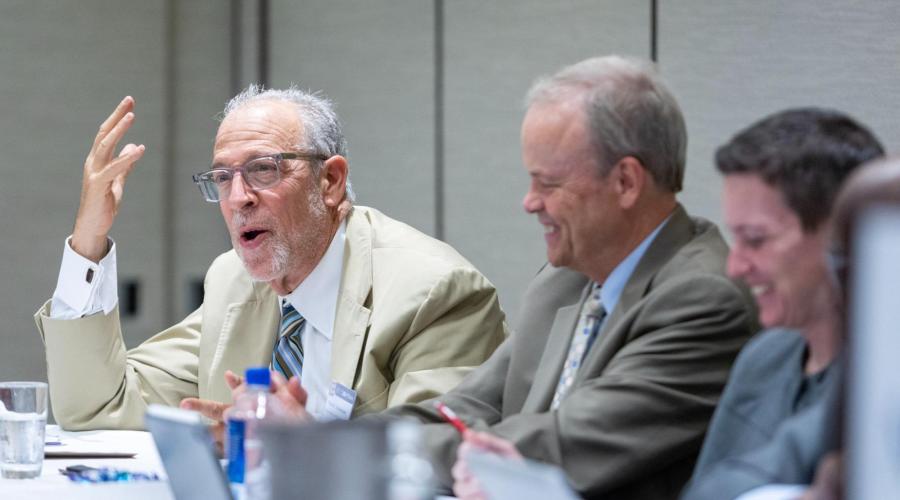
Triad 2024 Serves Up a Full Plate
“A great restaurant wants other great restaurants on the street,” began Martin F. Scheinman ‘75 at the 2024 Triad conference on labor relations. “After all, one night you might want Italian food and one night you might want steak and potatoes.” Where’s he going with this?
“If the other restaurants are not up to the standard,” he continued, “the natural, wise course of action is to visit an entirely different neighborhood and abandon the street. Similarly, if the arbitrators ready to serve lack the skill set, the integrity, their perceived and actual neutrality, then the entire profession will be rejected.”
“The key,” revealed Scheinman, “is to have the customers, clients, or consumers have confidence that if they cannot get into one of the great restaurants, another one will be there to serve.”
The audience and panel agreed: There is an ‘existential’ threat to the arbitration profession, and at the 2024 Triad (ILERA/LERA/FMCS) conference in New York City, practitioners, academics and neutrals from all over the world wanted to find solutions.
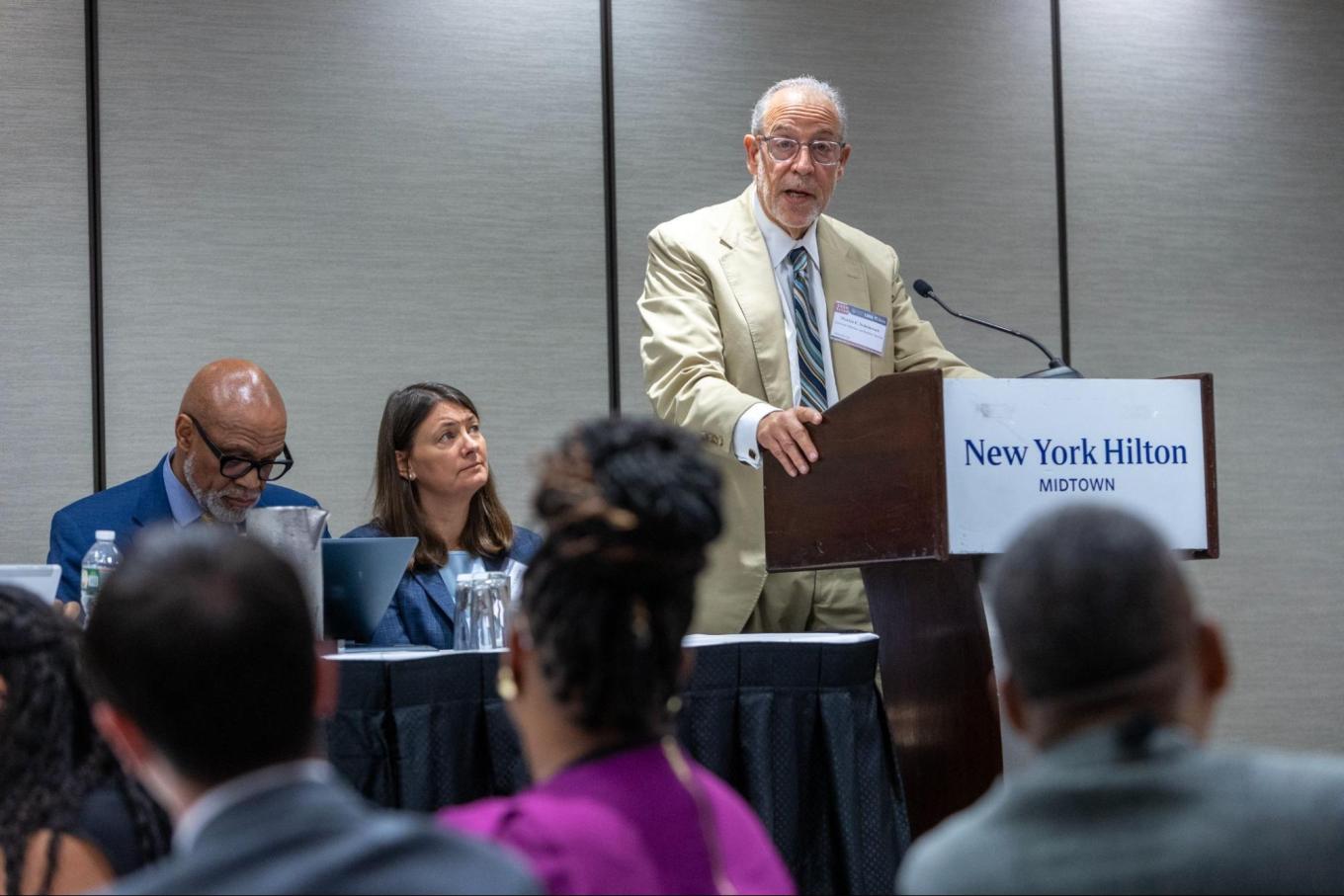
Scheinman’s analogy arrives during a panel titled Developments Toward an Inclusive Next Generation of Neutrals, but the conference also hosted speakers, research presentations, expert lectures, workshops, debates, roundtable discussions and poster sessions. There was even a trip to Major League Baseball (MLB) headquarters to talk with the deputy commissioner.
Towering in a tan suit, Scheinman went on to explain, “My basic belief–as embodied in The Scheinman Institute’s purpose–is that the danger to experienced arbitrators and to the arbitration profession is not more arbitrators, but arbitrators unable to meet the challenges of the day and the needs of the clients we serve.”
Although today’s audience and panel are inclusive, the arbitration field lacks diversity.
“79% were men; 21% were women; 93% were white or non-Hispanic; 7% were non-white; 74% held law degrees; 14% PhDs and 14% neither,” panelist Katrina Nobles rattled off statistics from a recent survey of the National Academy of Arbitrators.
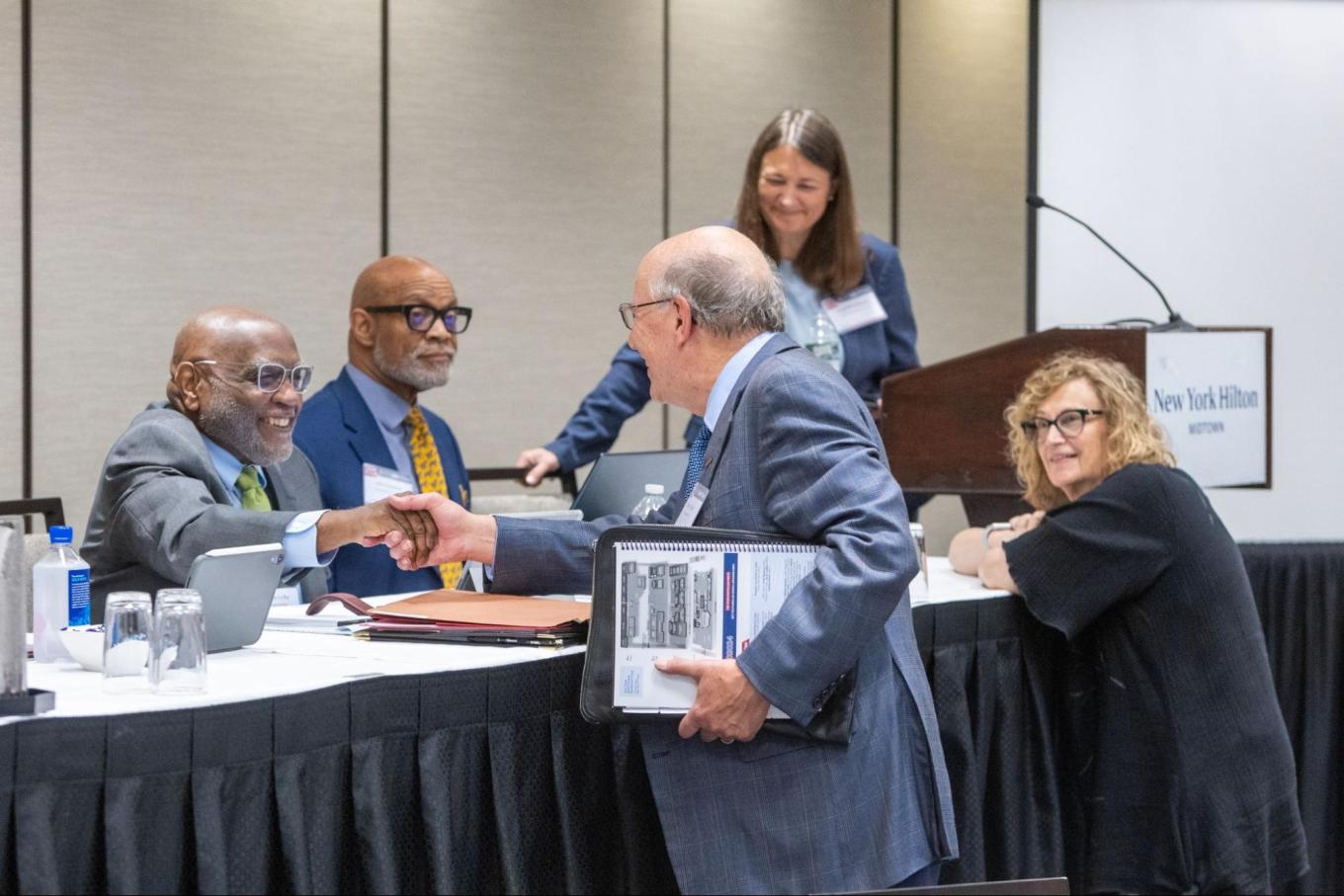
Perhaps some answers to this challenge sit in the panel's audience: members of Cornell ILR’s Labor Arbitration Development Program (LADP), which prepares professionals transitioning to a career as labor arbitrators and mediators.
“Every single person in the cohort has a different pathway into the field,” said Nobles, director of Conflict Programs at The Scheinman Institute. “We help them find the pathway that's going to be most successful for them based on the strengths they've already built.”
After the panel, Scheinman talked with Katie Rosen ‘08 from the LADP cohort. “Here, everyone brings such a different history for their lives, backgrounds and careers,” said Rosen. “We are learning so much just from each other and having conversations with these arbitrators who have seen everything in arbitrations over their careers. You can’t stump them!”
Scheinman has seen everything; He’s now headed a couple blocks south to MLB’s headquarters, where he also serves as MLB’s grievance arbitrator.
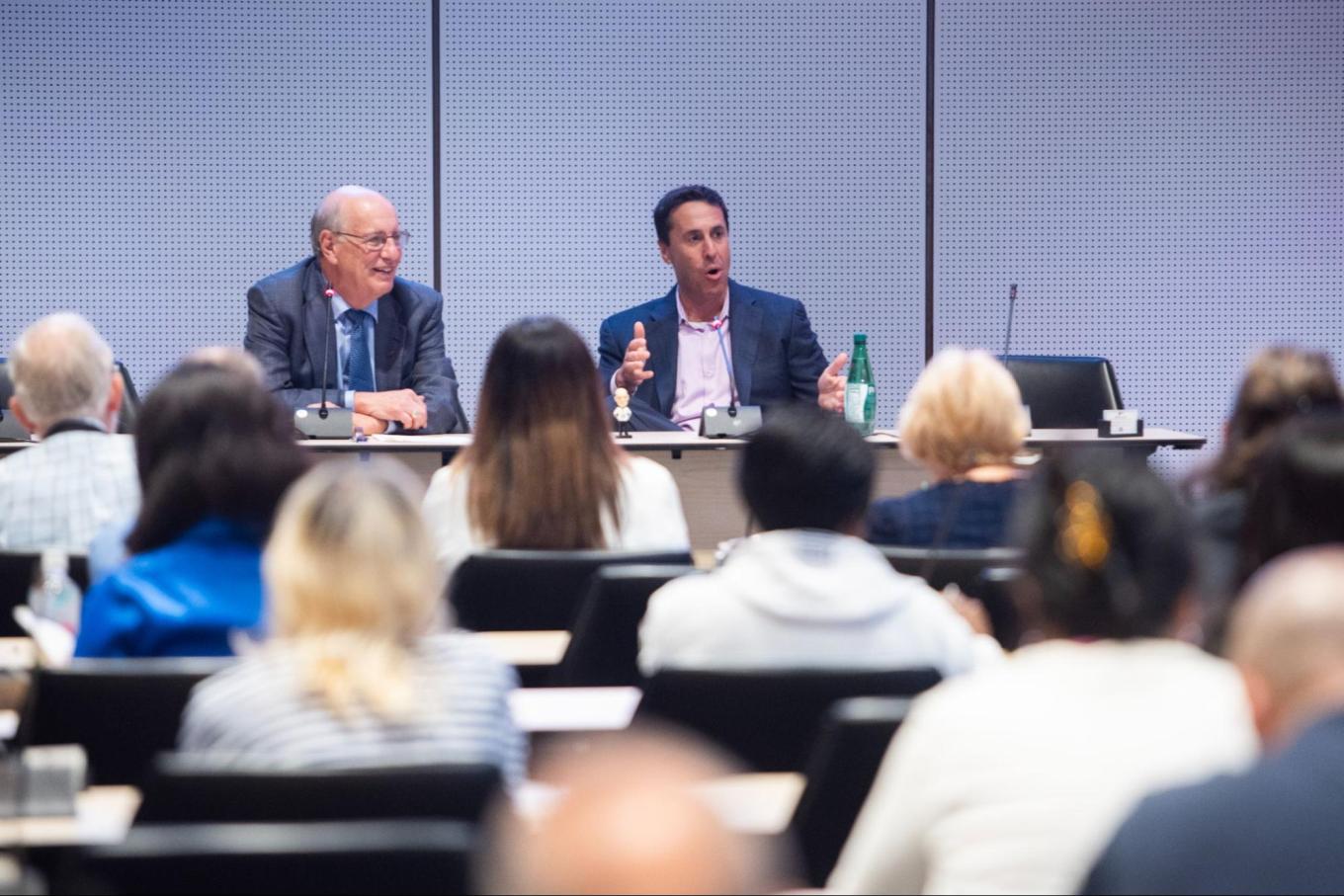
At MLB HQ, Harry Katz spoke with Dan Halem ‘88, deputy commissioner for baseball administration and Chief Legal Officer. Not only is Katz president of ILERA, one prong of the “Triad” organizations alongside LERA and FMCS, he’s also director of The Scheinman Institute and a professor who once taught Halem as an undergraduate–Halem still calls him “Professor Katz,” and a gifted bobblehead of Katz wobbles on the table.
Together, they delved into the complexities and challenges of arbitration in professional sports before fielding questions from the Triad audience. “Do you also bargain with the umpires?” began one audience member. “And how do you deal with the introduction of new technology?”
It’s a tie game. Bases loaded. Bottom of the ninth, two outs and a 3-2 full count. The away team’s catcher signals for a slider, but the pitcher shakes it off; he wants a fastball up top. He winds up and launches a four-seam heater that just clips the top of the digital strike zone overlay. The umpire calls it…BALL?! The visiting team’s manager charges the plate, giving the ump an earful before quickly getting ejected, all while the winning run waltzes over home plate unimpeded, under bubble gum and Gatorade showers. Angry visiting team fans storm to Google, “Why can’t they fire this umpire?” The answer is a labor issue.
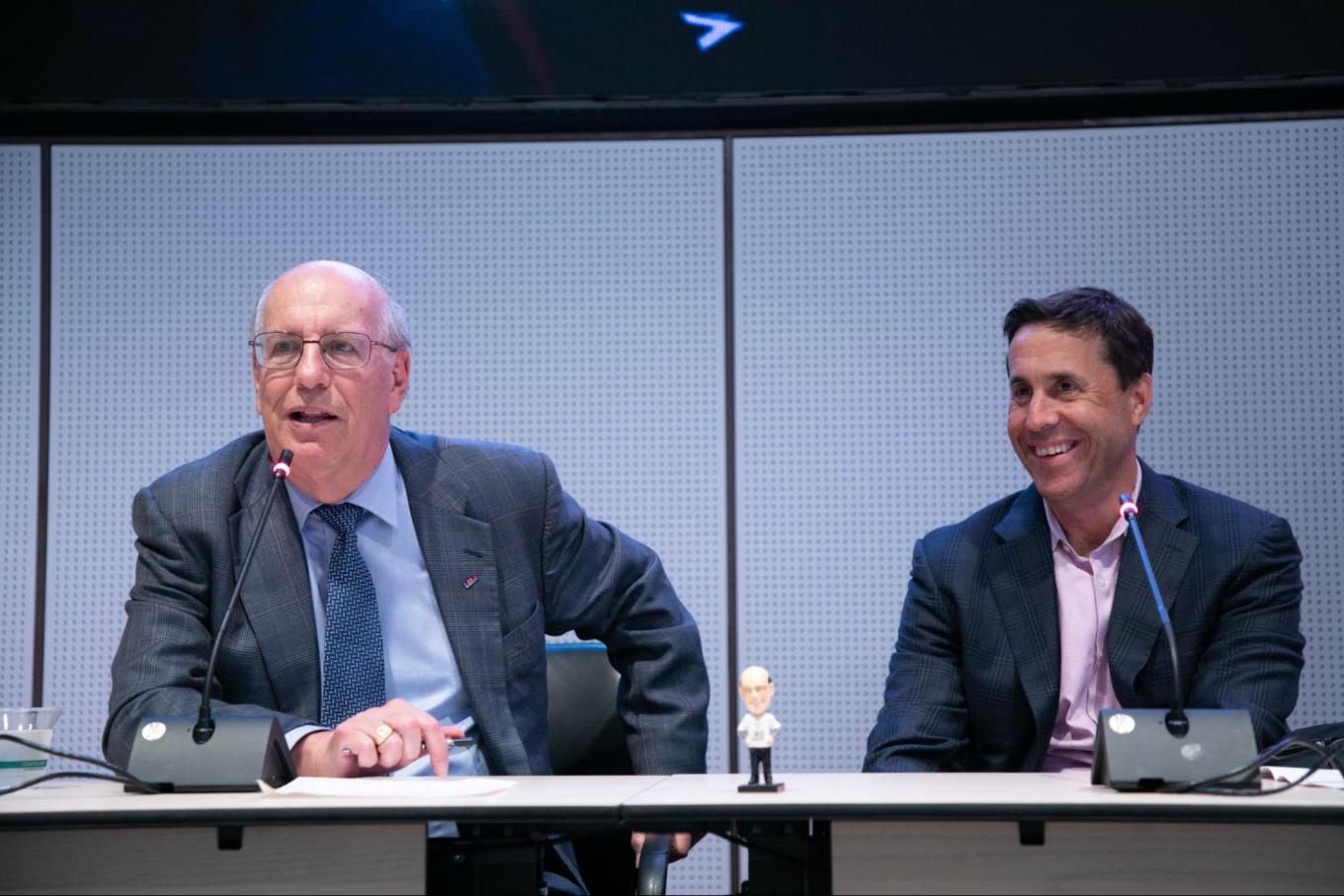
“Umpires’ biggest gripe–and I sympathize–is that when you watch a baseball game, you see on TV a box showing whether something's a ball or a strike,” said Halem. “Everybody sees that, right? Except them! It’s a hard job. It’s the kind of job that if you do everything right, nobody says anything, and if you don’t, then people get really angry. Having the umpire back there is kind of part of our game.”
“Technology has been the thorniest issue,” Halem reflected on MLB’s bargaining with the Umpire union. “We have a system that actually can call balls and strikes. So, for those of you who don't know much about baseball, the umpire behind the play calls balls and strikes, and we can automate that now. And it's instantaneous: the earpiece says ‘ball,’ the umpire says ‘ball.’ And it's accurate. We've tested that in the minor leagues. It works. We have not introduced it in the major leagues.”
MLB’s umpires have been unionized since 1970, and one of today’s bargaining concerns is the strike-and-ball calling technology. “Our umpire agreement actually expires in December, so, you know, it's a topic for them,” said Halem. “The umpires have a really hard job, and they do a really good job for us.”
“Labor relations in sports is difficult,” said Halem. “I think labor relations everywhere is difficult, you know? It's not an easy job.”
The panel wraps up, but not before Katz offers up some spare tickets to the Mets-Yankees game that night. Someone jumps for them. It’s right about dinner time, and the Triad audience is in luck; there’s lots of great restaurants on this street. Some go for Italian. Others go for steak and potatoes. Either way, the Triad and its offerings elevate the whole labor relations field: tonight, everyone’s plate is full.
